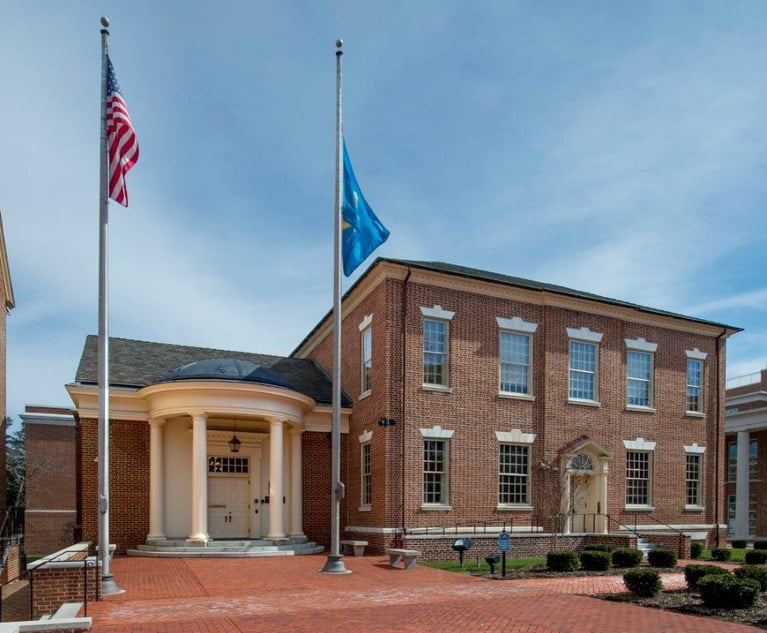Chancery Rejects Controller's Conspiracy Claims
The recent decision by Vice Chancellor Donald F. Parsons Jr. garnered much attention for his finding that the plaintiffs' conduct was "prejudicial to the administration of justice" and had undermined the integrity of the proceedings.
October 14, 2015 at 03:09 AM
7 minute read
The recent decision by Vice Chancellor Donald F. Parsons Jr. in OptimisCorp v. Waite, C.A. No. 8773-VCP (Del. Ch. Aug. 26, 2015), appeal pending, garnered much attention for his finding that the plaintiffs' conduct was “prejudicial to the administration of justice” and had undermined the integrity of the proceedings. This led him to dismiss one claim against the defendants and to draw certain adverse inferences against the plaintiffs in connection with certain of their other claims as a sanction for their misconduct. However, the case is also noteworthy for some of the substantive holdings relating to breach of fiduciary duty claims. Specifically, Parsons cast doubt that a conspiracy among fiduciaries is a legally cognizable cause of action; rejected the claim that a director's disagreement with the company's strategic vision without telling the rest of the board amounts to actionable disloyalty; and rejected the claim that directors breached their duty of loyalty when they failed to provide advance notice to a CEO with board-appointment rights under a stockholders agreement of their intent to remove him so that he could first exercise those rights.
The facts of the case were extensively discussed by Parsons in this 213-page, post-trial opinion. In brief, the board of the plaintiff corporation voted to terminate the plaintiff CEO for alleged misconduct. The board also voted to amend a stockholders agreement to remove a provision that granted the initial stockholders, controlled by the CEO, the right to appoint a majority of the board. The CEO eventually prevailed in having his removal and the amendment to the stockholders agreement vacated in a Section 225 action. The CEO and the company then sued the directors who had sought his removal and the company's former chief financial officer, alleging that they had engaged in a conspiracy that, in Parsons' words, “involved, essentially, everyone who disagreed with the CEO's management of the company,” and asserting breach of fiduciary duty claims and other claims against them.
The first holding of note involving fiduciary duty claims was Parsons' questioning whether a cause of action exists under Delaware law for a conspiracy among fiduciaries to breach a fiduciary duty. Parsons first noted the case law on vicarious liability and fiduciaries is “less than crystalline.” In the fiduciary duty context, conspiracy is treated as coterminous with aiding and abetting. He concluded that it would make little sense for a lower standard to apply to conspiracy than aiding and abetting. In those instances where a fiduciary takes actions that would amount to aiding and abetting by a nonfiduciary, that conduct amounts to a direct breach of fiduciary duty. The same would be true of a conspiracy: an actor's entry into a conspiracy to facilitate another actor's breach of fiduciary duty to an entity to which the first actor owed a fiduciary duty would itself be a breach of the first actor's fiduciary duties. Under the circumstances, there would be minimal additional benefit from holding a fiduciary vicariously liable, rather than directly liable, for participating in another fiduciary's breach of duty.
NOT FOR REPRINT
© 2024 ALM Global, LLC, All Rights Reserved. Request academic re-use from www.copyright.com. All other uses, submit a request to [email protected]. For more information visit Asset & Logo Licensing.
You Might Like
View All


Offit Kurman Fends Off Long-Running Legal Mal Suit Over Del. Bankruptcy Litigation Fallout
3 minute read
Richards, Layton & Finger Director Elected a Fellow of the American College of Governance Counsel
1 minute readTrending Stories
- 1A&O Shearman Adopts 3-Level Lockstep Pay Model Amid Shift to All-Equity Partnership
- 2A RICO Surge Is Underway: Here's How the Allstate Push Might Play Out
- 3The Law Firm Disrupted: Playing the Talent Game to Win
- 4Data-Driven Legal Strategies
- 5Preparing Your Law Firm for 2025: Smart Ways to Embrace AI & Other Technologies
Featured Firms
Law Offices of Gary Martin Hays & Associates, P.C.
(470) 294-1674
Law Offices of Mark E. Salomone
(857) 444-6468
Smith & Hassler
(713) 739-1250






